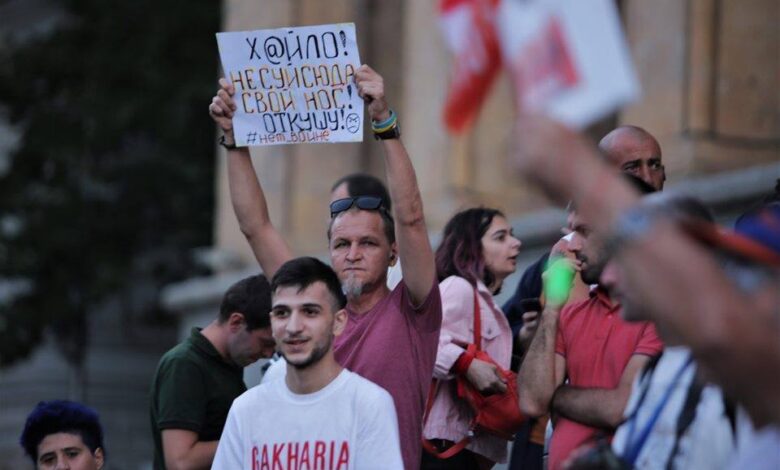
Two Foreigners Detained for ‘Blocking Road’ at Protest, One Faces Deportation
Two foreigners – Russian citizen Nikolay Belikov and Azerbaijani journalist Afgan Sadygov – have been sent to 14 days in detention after a court found them guilty of the administrative offense of “blocking the road” during a daily rally on Tbilisi’s Rustaveli Avenue. Judge Lela Tsagareishvili also ordered Belikov’s expulsion from Georgia and imposed a two-year entry ban.
The two protesters were detained on October 22 and placed in administrative detention the following day. Around 70 people are estimated to have been arrested over the past week after the Georgian Dream Parliament hastily amended several laws on October 16, mandating immediate detention instead of fines for protest-related offenses, such as blocking roads to traffic or covering faces during rallies, and introducing criminal liability of up to one year in prison for repeat offenses.
According to RFE/RL’s Georgian Service, citing a lawyer, Belikov faces deportation to Russia after his two-week detention ends if no other country grants him asylum. He fled from Russia in 2016 and has lived in Georgia for several years, and opposes Russia’s war in Ukraine. The Interior Ministry claimed he artificially blocked the road on Rustaveli Avenue and failed to obey police orders.
Judge Lela Tsagareishvili’s decision to expel Belikov and ban his reentry follows the June amendments allowing courts to impose such measures on foreigners found guilty of administrative offenses. The MIA official had warned, as the one-party parliament was passing the amendments, that the new measures would particularly target foreign participants in the ongoing anti-government protests.
Another detained foreigner, Afgan Sadygov, is an Azerbaijani journalist who previously spent months in a Georgian prison while facing extradition to Azerbaijan. He was released on bail on April 17, shortly before his nine-month extradition detention was set to expire. In February, the European Court of Human Rights barred Georgia from extraditing Sadygov until a final judgment is issued, which could take years. At the time, Sadygov was in jail and ended his 161-day hunger strike after learning of the court’s decision.
After his release, Sadygov began actively participating in ongoing anti–Georgian Dream and pro-EU rallies on Tbilisi’s Rustaveli Avenue, where the demonstrations have continued for more than 330 days, beginning on November 28, 2024, when Georgian Dream halted the country’s EU accession process. Protesters have gathered near the Parliament every night since, blocking the street to traffic. GD Prime Minister Irakli Kobakhidze recently vowed to end the daily rallies.
Also Read:
- 14/10/2025 – CSOs: Georgian Dream Toughening Laws to ‘Ban Peaceful Protest’
- 02/07/2025 – Georgian Dream Grants Interior Ministry Authority to Inspect Foreigners’ Homes, Workplaces
This post is also available in: ქართული